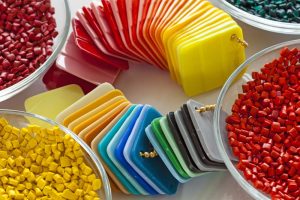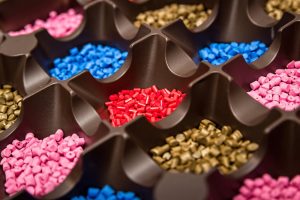One of the most important aspects of plastic injection molding is the materials used in the process. Custom injection molders know how to make their choice of plastic resin based on the intended use for the component, as well as your specific requirements. Let’s take a look at the different materials that can be used for plastic injection molding, and what they’re best suited for.
What materials are used for plastic injection molding?
Injection molding of a plastic component is a process that involves designing the part and the mold for the manufacturing of that part before actually starting the process. However, the choice of material for injection molding is also important, as it will give the finished product the desired characteristics. Here are some of the most frequently-used plastic resins for injection molding.
Polycarbonate
Polycarbonates constitute a group of thermoplastic polymers that contain different carbonate groups as part of their chemical structure. They are a strong material that can be used for various purposes in engineering, and there are also some transparent variants. They can be easily thermoformed, molded, and worked.
ABS
ABS is short for acrylonitrile butadiene styrene, and it is an extremely frequent thermoplastic polymer. It is made through the process of polymerization of acrylonitrile and styrene with presence of polybutadiene. It is amorphous and without any melting point. It transitions to glass at 105℃. ABS has a variety of uses, from drain-waste piping to plastic musical instruments and sports equipment.
Polyolefin
This is a type of polymer that is made from simple olefin, as a monomer. There are different polyolefins used for injection molding, such as polypropylene and polyethylene. Polyolefins are widely used for manufacturing food containers, as well as in some fabrics and footwear.
Nylons
Nylon is a generic name for various synthetic polymers that are based on semi-aromatic or aliphatic polyamides. It is a silky material that can easily be melted into different shapes, films, or fibers. It is created from repeating units linked together with amide links. Its uses are varied and range from food packaging to clothing.
Rubber
Natural rubber consists of isoprene polymers, and it has minor impurities from other organic compounds, with the addition of water. Rubber is one of the most widely-used materials on the planet, and it has a wide range of uses.
Acrylic
This is a transparent thermoplastic that is commonly used in sheet form as a shatter-resistant and lightweight alternative to regular glass. Other uses include lenses, paint, medical devices, security barriers, LCD screens, and modern furniture.
Polyacetal
Polyacetal is an engineering plastic mainly used for production of precision parts that require the excellent dimensional stability, low friction, and high stiffness. Common applications include eyeglass frames, ski bindings, lock systems, ball bearings, and gear wheels.
Which custom injection molders can design and manufacture the necessary parts for my business?
Custom injection molding is a complex and complicated process that requires experience and knowledge to perform correctly. While there are many reasons to choose plastic injection molding for your required parts, you should still pay attention to the company you choose. You want to hire professionals who are able to choose the best resin for your needs and that have automated a part of their injection molding process for better results. There is only one such company that springs to mind, and that’s Wunder Mold.
We have 29 years of experience in plastic injection molding, and we know how to create various high-quality parts and components per our clients’ exact specifications. We ensure our end-product serves your needs perfectly by taking the time to professional design and manufacture both the mold and the part. We will listen to your requirements and translate them into reality. Call (707) 448-2349 or send an email to sales@wundermold.com. Reach out to us today!

